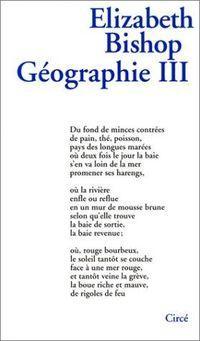CRUSOE IN ENGLAND
(extrait)
The sun set in the sea; the same odd sun
rose from the sea,
and there was one of it and one of me.
The island had one kind of everything:
one tree snail, a bright violet-blue
with a thin shell, crept over everything,
over the one variety of tree,
a sooty, scrub affair.
Snail shells lay under these in drifts
and, at a distance,
you'd swear that they were beds of irises.
There was one kind of berry, a dark red.
I tried it, one by one, and hours apart.
Sub-acid, and not bad, no ill effects;
and so I made home-brew. I’d drink
the awful, fizzy, stinging stuff
that went straight to my head
and play my home-made flute
(I think it had the weirdest scale on earth)
and, dizzy, whoop and dance among the goats.
Home-made, home-made! But aren’t we all?
I felt a deep affection for
the smallest of my island industries.
No, not exactly, since the smallest was
a miserable philosophy.
Because I didn’t know enough.
Why didn't I know enough of something?
Greek drama or astronomy? The books
I'd read were full of blanks;
the poems--well, I tried
reciting to my iris-beds,
“They flash upon that inward eye,
which is the bliss...” the bliss of what?
One of the first things that I did
when I got back was look it up.
CRUSOÉ EN ANGLETTERRE
Le soleil se couchait dans la mer ; le même étrange soleil
se levait sur la mer,
il y avait un soleil, il y avait un moi ;
L’île avait de toute espèce une chose unique :
bleu-violet éclatant, un unique escargot d’arbre
à la mince coquille rampait sur toute chose,
sur l’unique variété d’arbre,
noirâtre truc rabougri.
Des coquilles d’escargots s’amoncelaient au-dessous,
et, à quelque distance,
on aurait juré des parterres d’iris.
Il y avait une seule espèce de baie, rouge foncé.
J’y ai goûté, une à la fois, à des heures d’intervalle.
Sub-acide, pas mauvaise, sans effets nocifs ;
j’en ai fait une décoction maison. Je buvais
cette saleté mousseuse et cuisante
qui me montait à la tête
et je jouais de ma flûte faite maison
(je crois qu’elle avait la gamme la plus bizarre du monde),
― la tête me tournait, je criais et dansais parmi les chèvres.
Fait maison, fait maison ! Ne le sommes-nous pas tous ?
J’avais une profonde affection pour
la moindre de mes industries insulaires.
Non, pas exactement, car, de mes industries, la moindre était
une misérable philosophie.
Car j’en savais trop peu.
Pourquoi en savais-je trop peu sur quoi que ce soit ?
drame grec ou astronomie ? Les livres
que j’avais lus étaient pleins de blancs ;
les poèmes – hé bien, j’essayai
de réciter à mes parterres d’iris
« ils frappent de leur éclat cet œil intérieur,
et c’est la félicité… » Félicité née de quoi ?
L’une des premières choses que je fis
à mon retour fut de la chercher…
Elizabeth Bishop, Géographie III [Geography III, 1976], Éditions Circé, 1991, pp. 22-23-24-25. Édition bilingue. Préface d’Octavio Paz. Traduit de l’anglais (américain) par Alix Cléo Roubaud, Linda Orr et Claude Mouchard.

ELIZABETH BISHOP

Source
■ Elizabeth Bishop
sur Terres de femmes ▼
→ 8 février 1911 | Naissance d’Elizabeth Bishop (notice bio-bibliographique + un poème extrait de North & South)
→ Invitation to Miss Marianne Moore (poème extrait d'Un printemps froid)
■ Voir | écouter aussi ▼
→ (sur poets.org) une notice bio-bibliographique (+ plusieurs poèmes dits par Elizabeth Bishop)
Retour au répertoire de février 2012
Retour à l’ index des auteurs
